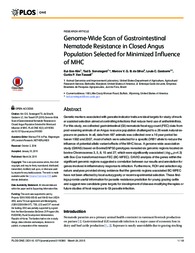Genome-wide scan of gastrointestinal nematode resistance in closed Angus population selected for minimized influence of MHC.
Genome-wide scan of gastrointestinal nematode resistance in closed Angus population selected for minimized influence of MHC.
Author(s): KIM, E. S.; SONSTEGARD, T. S.; SILVA, M. V. G. B.; GASBARRE, L. C.; TASSEL, C. P. V.
Summary: Genetic markers associated with parasite indicator traits are ideal targets for study of marker assisted selection aimed at controlling infections that reduce herd use of anthelminthics. For this study, we collected gastrointestinal (GI) nematode fecal egg count (FEC) data from post-weaning animals of an Angus resource population challenged to a 26 week natural exposure on pasture. In all, data from 487 animals was collected over a 16 year period between 1992 and 2007, most of which were selected for a specific DRB1 allele to reduce the influence of potential allelic variant effects of the MHC locus. A genome-wide association study (GWAS) based on BovineSNP50 genotypes revealed six genomic regions located on bovine Chromosomes 3, 5, 8, 15 and 27; which were significantly associated (-log10 p=4.3) with Box-Cox transformed mean FEC (BC-MFEC). DAVID analysis of the genes within the significant genomic regions suggested a correlation between our results and annotation for genes involved in inflammatory response to infection. Furthermore, ROH and selection signature analyses provided strong evidence that the genomic regions associated BC-MFEC have not been affected by local autozygosity or recent experimental selection. These findings provide useful information for parasite resistance prediction for young grazing cattle and suggest new candidate gene targets for development of disease-modifying therapies or future studies of host response to GI parasite infection.
Publication year: 2015
Types of publication: Journal article
Unit: Embrapa Dairy Cattle
Keywords: cattle, genetic markers, heritability
Observation
Some of Embrapa's publications are published as ePub files. To read them, use or download one of the following free software options to your computer or mobile device. Android: Google Play Books; IOS: iBooks; Windows and Linux: Calibre.
Access other publications
Access the Agricultural Research Database (BDPA) to consult Embrapa's full library collection and records.
Visit Embrapa Bookstore to purchase books and other publications sold by Embrapa.

